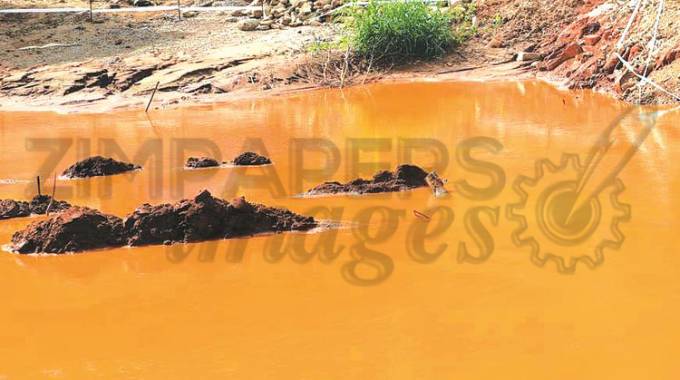
Under the craggy magnificence of the Eastern Highlands, Nyabamba River snakes from eastern Chimanimani down into Rusitu Valley in a cumbersome journey dictated by geomorphology.
Standing and guarding the channel through and through are huge rocks tinged grey by fungal lichens, rolling moorlands, high mountain heath and pine plantations.
Fatigued by the meandering and subsequent milking by hundreds of villagers and farmers, Nyabamba River, finally vomits whatever is left into mighty Nyahode River.
Banana coves, teeming livestock, wildlife and a buffet of crops survive on it. It is a source of life, if not life itself.
But that is no longer be the case.
Its crystal clear and catting waters are no longer the same. The river banks have been violated and raped. The brown waters you see today are nothing, but tears of blood. They tell an emotional story.
Looking at it, one would be justified to think that the big boulders that were uprooted by Cyclone Idai in March last year, were responsible for changing the once clear water.
The boulders have barely moved since the disaster hit, but illegal gold panners have moved in. Like ruthless moles, the panners have foraged everywhere in search of gold.
For some time, they have had running battles with the police.
When President Mnangagwa announced a mandatory lockdown which required everyone to stay at home, they disappeared for a short while only to return in large numbers.
And villagers are worried about the damage that these activities are inflicting not only on the environment, but also on their health and that of their livestock.
“This river is our source of livelihood. Our cattle drink this water, we water our crops and we drink from it. We cannot do anything to these panners because they are a law upon themselves. Even when the police come, they disappear for a short time and come back. If you look at the colour of this water now, you cannot drink it so we now have to look for alternative sources of water,” said Mrs Raina Bera.
Another villager, Mr Raphael Makumbiza said they had hoped the lockdown would to stop them and allow the water to settle a bit, but that was not to be.
“We would have thought that with this Covid-19 pandemic, they would stay away, but they only stayed away for a short time and came back.
“They are destroying our environment. Some of these people are not from here so they will go back to their areas once they have exhausted the gold, but we have to stay behind with the degradation that they would have caused.
“We have to find other safe sources of water because this water is now contaminated. Our livestock needs water and our crops need water. They don’t care about all this, but we do because at the end of the day we will be here for years to come,” said Mr Makumbiza.
Nyabamba is only one of the areas that have been besieged by gold panners in Chimanimani. Many more miners are operating from Agricultural and Rural Development Authority (ARDA) Rusitu estate as well as in the Kurwaisimba area.
According to Environmental Management Agency (EMA) provincial manager Mr Kingstone Chitotombe, the problem of illegal miners has been ongoing for a long time and has had devastating effects on the environment.
He said EMA had been engaging police to disperse them, but they always come back.
“We constantly engage police so that they move in and disperse these gold panners. In the past two weeks there was a police operation, but they come back. This has been happening for a long time,” he said.
Mr Chitotombe said Government should ideally come in and reclaim the land to mitigate against the damage done to the environment, but it was difficult as the miners always come back and do more damage.
Chimanimani District Development Coordinator Mr Joseph Manyurapasi said the gold panners were a source of headache for authorities as they were flouting measures put in place by Government during the level two national lockdown.
“Generally people have been complying with the regulations as stated by Government, but we have hotspots where there are illegal mining activities taking place in the Rusitu and Kurwaisimba areas. We have had an enforcement team led by the police moving into the areas and ensuring that people are in compliance. In some cases, some illegal milling machines have been impounded by police so that has also lessened the activities there. Other security services have also joined the fight to complement police to bring sanity in the area,” he said.
While the need to ensure the environment is preserved at all cost is important, there is also need to harness the natural resources that Chimanimani has.
Besides its flora and fauna that are an attraction to many tourists, Chimanimani is rich in minerals, including gold and diamonds hence the influx of illegal miners.
This has brought to the fore the urgent need to ensure mining activities are regularised.
Minister of State for Provincial Affairs and Devolution in Manicaland (Dr Ellen Gwaradzimba) has said the incorporation of the artisanal miners into the development of the province is key as they could make meaningful contribution to the economy.
She emphasised the need to continue with the process of formalising them to ensure that their operations are done in accordance with the law and the proceeds move through the formal channels for the benefit of the province.
This will also do more good for the environment and the livelihoods of the thousands who depend on agriculture for survival.
